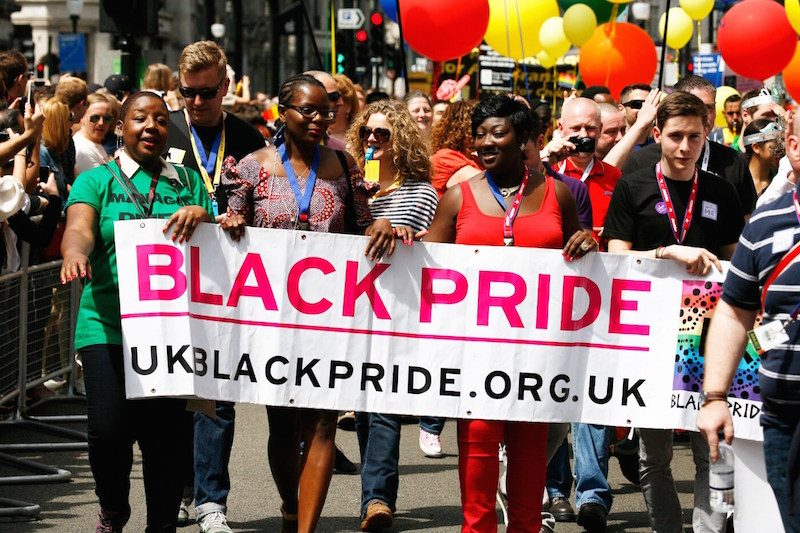Former DIVA editor Jane Czyzselska examines her white privilege ahead of UK Black Pride this weekend\r
My first Pride event was at the vodka-soaked end of the 1980s. Prime Minister Margaret Thatcher’s dog-whistle campaign to stop the promotion of homosexuality in schools and public services was at fever pitch. Conservative party cronies railed against “pretend lesbian and gay families”. A young Sinead O’Connor, all crew cut and jackboots, lamented the violence of the police that killed Black boys on mopeds and gaggles of lesbians gathered to hoist placards that read “lesbian families are not pretending”.
To take part in one of the nationwide demonstrations against the Clause was an act of defiance. The Clause was shorthand for the Bill that later became Section 28, the 1988 Local Government Act which forbade councils from “intentionally promoting homosexuality” in schools or other areas of their work. The Conservative party told us we were pariahs who deserved neither recognition nor legal protection.
Manchester’s chief of police James Anderton pronounced that gay men, dying from AIDS, were “swimming in a cesspit of their own making”. It was an appalling judgement. I resolved right there to do all I could to fight this war on homosexuality. I didn’t yet realise my relative privilege as a White woman, however. I described myself as anti-racist, I had Black and Asian friends, the usual, but I wasn’t doing much to challenge the grip of White supremacy.
Sure, I’d talk to anyone who’d listen about why I thought the police should be kicked out of Tottenham’s Broadwater Farm; I’d challenge media and government propaganda that demonised Black communities but I didn’t yet understand how whiteness underpinned capitalist cis-hetero-patriarchy.
I didn’t understand how my Whiteness protected me from police suspicion and brutality, how my Whiteness and class privilege had made it possible for me to attend good schools, how being White had shielded me from racist slights and slurs from teachers and school kids alike. As an adult, I didn't understand how being white opened doors at job interviews, how being White and middle class made me feel included and acknowledged by women’s magazine editors – even if my sexuality wasn’t. I didn’t notice that it was people who looked like me and had a similar code of etiquette who were awarded positions of power. It was the racial equivalent of snow blindness.
I didn’t realise until pretty late in my tenure as editor of DIVA that it wasn’t enough to be a nice anti-racist with POC friends. I didn't realise it wasn't okay to feature stories written by white journalists about queer, trans, people of colour (QTPOC) experiences. It took the anger and criticism of QTPOC at UKBP 2015 about DIVA's "Whiteness" to realise that I was not using my power enough to fight the wide-ranging effects of White supremacy and racism.
Until I understood that structural racism is part of the fabric of cis-hetero-patriarchy I couldn’t learn how to be a better ally. So I resolved not to take part in and organise all-white panels, I stopped White writers from writing about Black LGBTI experiences and gave space to more QTPOC voices, I organised meetings with other White LGBTI organisations, introducing QTPOC activists to editors, asking White-run event organisers why there weren't any QTPOC on their DJ or performance line-up? I shared and sometimes handed over the platform I had as a White lesbian to QTPOC. I challenged individuals and organisations within the LGBTI community about their White privilege, asking them where the POC were in their organisation, suggesting ways they could actively undermine White supremacy by amplifying POC jobs, voices and influence.
UK Black Pride 2014
I share this small list as people in the community are gearing up for London’s Pride weekend and the UKBP committee prepare for the 12th celebration of QTPOC. I have tried to change my behaviour, not as virtue-signalling but to unpack my own white privilege so as to better undermine the system that perpetuates racism. I have educated myself through sites like whitenonsenseroundup and Mia McKenzie’s blackgirldangerous, by reading books such as Claudia Rankine’s Citizen, bell hooks’ Yearning and reaching out to other White allies. I will continue to listen and learn about how White privilege cushions me from the practical, physical and psychological ravages of racism and use this knowledge to challenge not only myself but other individuals and institutions.
Many White people in the LGBTI community still ask, “why UK Black Pride?” This question suggests there’s a lack of awareness about the need to come together and celebrate with people who understand what it’s like to experience racism as well as homophobia, racism that unfortunately often comes from White LGBTI people. As with my own experience White privilege operates within the LGBTI community in many ways, often unknowingly.
When I worked at DIVA, my team and publishers supported UKBP. Today DIVA is a principal media sponsor of the brilliant event. Since I no longer edit DIVA (hats off to new editor, Carrie Lyell) I continue to do what I can by interrogating White privilege with the aim of supporting the dismantling of White supremacy.
UK Black Pride takes place at Vauxhall Pleasure Gardens this Sunday. For more info, visit ukblackpride.org.uk.
Only reading DIVA online? You're missing out. For more news, reviews and commentary, check out the latest issue. It's pretty badass, if we do say so ourselves.
divadigital.co.uk // divadirect.co.uk
